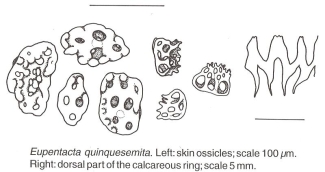E-Fauna BC: Electronic Atlas of the Wildlife of British Columbia
Eupentacta quinquesemita (Selenka, 1867)
White Gherkin; White Sea Cucumber Family: Sclerodactylidae Extracted from Sea Cucumbers of British Columbia, Southeast Alaska and Puget Sound by Philip Lambert.
|
||||||||||||||||||||||||||||
